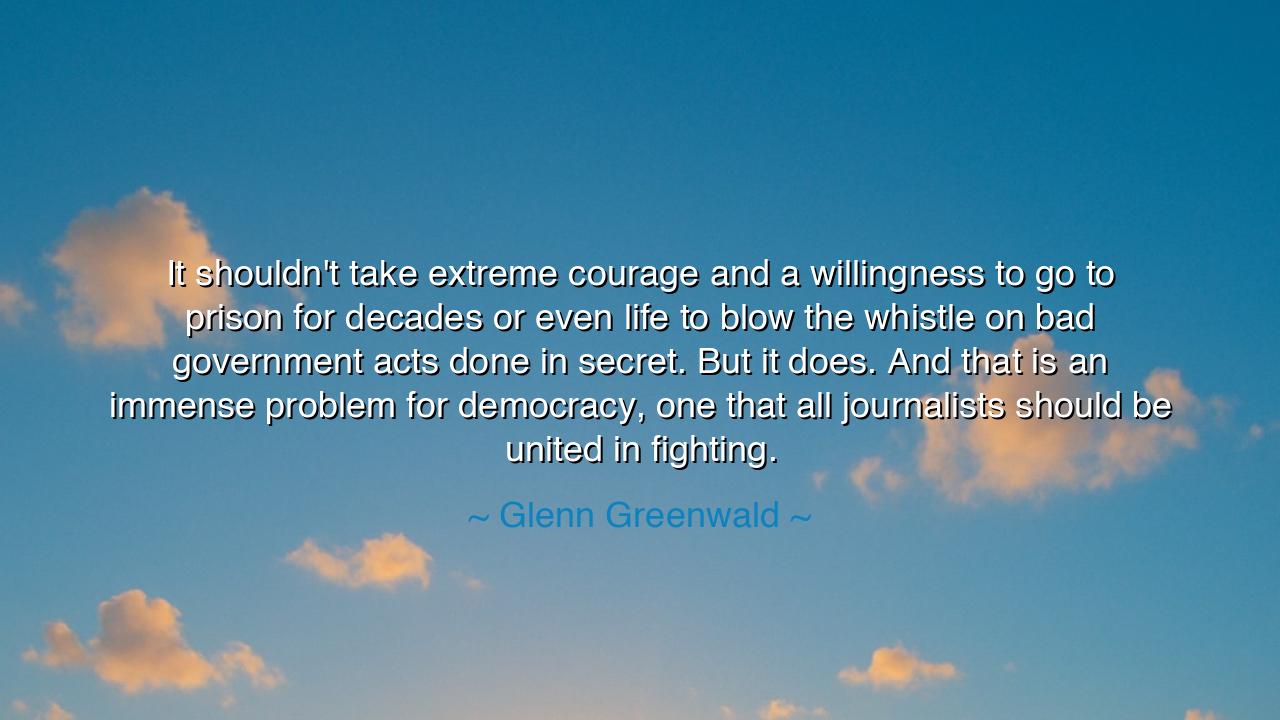
It shouldn't take extreme courage and a willingness to go to
It shouldn't take extreme courage and a willingness to go to prison for decades or even life to blow the whistle on bad government acts done in secret. But it does. And that is an immense problem for democracy, one that all journalists should be united in fighting.






“It shouldn't take extreme courage and a willingness to go to prison for decades or even life to blow the whistle on bad government acts done in secret. But it does. And that is an immense problem for democracy, one that all journalists should be united in fighting.” Thus spoke Glenn Greenwald, a man whose pen has often cut through the armor of power, revealing what those in high places would rather remain unseen. In these words lies a cry not merely for truth, but for justice, for the preservation of freedom, and for the defense of the sacred covenant between the people and their rulers. It is a lament for an age when speaking truth has become an act of defiance — and a call to courage for those who still believe that democracy cannot live in darkness.
The meaning of this saying reaches deep into the moral foundation of society. Greenwald reminds us that the health of a democracy depends not on wealth or might, but on transparency, on the free exchange of truth between government and citizen. When power hides its deeds in the shadows, when secrecy becomes the tool of manipulation, the voice of truth must rise — and often, it rises from the few who dare to blow the whistle. Yet in our time, such truth-tellers are punished as traitors, while those who deceive are honored as patriots. The courage it now takes to expose corruption has grown monstrous, because the structures meant to protect truth have been captured by the very forces it threatens.
The origin of this wisdom is rooted in Greenwald’s own life and work. He was the journalist who, in 2013, published the revelations of Edward Snowden, who exposed the vast machinery of government surveillance that spied not only on enemies abroad but on citizens at home. Snowden’s act of conscience — his choice to reveal the secret violation of liberty — forced him into exile, hunted by the nation whose ideals he sought to defend. Greenwald’s words emerge from this crucible of courage and fear: he had seen firsthand how truth became a crime, and how democracy was weakened by the silence of those too afraid to speak.
History, too, offers its reflections of this struggle. In the ancient world, Socrates stood before the court of Athens — the cradle of democracy — condemned not for falsehood, but for questioning authority and awakening thought. “The unexamined life is not worth living,” he said, and for this devotion to truth, he was put to death. So too in modern times, Daniel Ellsberg, who released the Pentagon Papers during the Vietnam War, risked his freedom to expose deception at the highest levels. Each of these men, separated by centuries, acted upon the same principle: that truth belongs not to kings or governments, but to the people — and that to suppress it is to wound the soul of a nation.
Greenwald’s lament — that it should not take extreme courage to tell the truth — speaks to the decay of moral order in societies that claim to be free. When fear replaces honesty, when secrecy is justified in the name of security, the citizen becomes a servant, and the press becomes a weapon of power rather than its watchdog. Yet he reminds us that journalists, the heirs of the ancient scribes and chroniclers, bear a sacred duty. Their craft is not mere writing; it is the preservation of memory, the defense of truth against oblivion. In a world that punishes the truth-teller, every journalist who stands firm becomes a guardian of democracy itself.
To live by this teaching requires courage, not only from the few who uncover secrets, but from all who consume the truth. The people must learn to question, to read deeply, to defend those who speak at great cost. For the silence of the many is the shield of the corrupt. Let each person ask: Do I honor truth, even when it is inconvenient? Do I defend those who reveal what is hidden, or do I turn away because it troubles me? The survival of liberty depends not only on those who write the truth, but on those who refuse to forget it.
The lesson, then, is eternal: truth is the lifeblood of freedom, and secrecy its silent assassin. No nation can call itself free while its people live blindfolded by lies. Support those who dare to reveal injustice, protect those who speak, and unite — as Greenwald commands — in the defense of transparency and accountability. For the courage of a few may awaken the conscience of the many. And when the people rise to demand honesty from their rulers, when journalists become once more the light-bearers of a darkened age, then democracy will not merely survive — it will live again, radiant and whole, built not on fear, but on truth.






AAdministratorAdministrator
Welcome, honored guests. Please leave a comment, we will respond soon